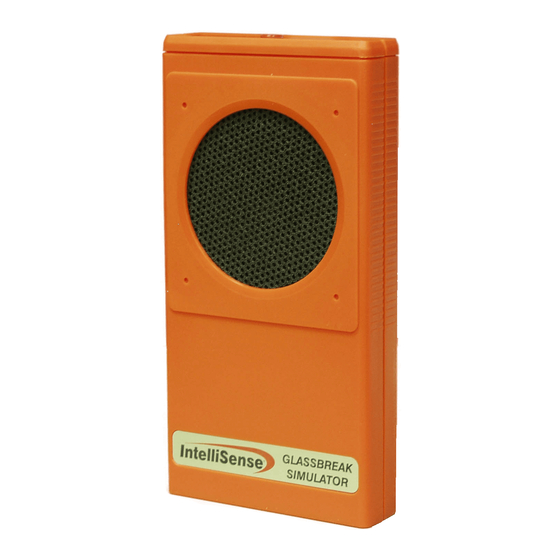Advertisement
Quick Links
English
OPERATING INSTRUCTIONS
WARNING
produces extremely loud sounds and
can be hazardous to hearing when
used at close range.
Never operate
the FG-701
when it is
pointed toward
someone's
head.
This glassbreak simulator is for testing
the range and function of all
FlexGuard
Most glassbreak models have the
"Activate" test mode feature described
below, including models:
FG10xx, FG15xx, FG16xx, FGW-15xx, 5853, FG8M, 5852H
and others.
OPERATING THE SIMULATOR
In the following, " flex " refers to the low frequency sound
caused by gently thumping the window and " audio " refers to
the high frequency sound from the glassbreak simulator.
If the detector range is adjustable, check that it is set correctly
per the detector's installation instructions.
®
FlexGuard
glassbreak detectors with test mode must be in
test mode for accurate testing with the FG-701. For those
detectors, use Activate to start test mode. Refer to the
detector's installation instructions for test mode details.
A
For all detectors that
have test mode
To Activate glassbreak detector test mode:
1. Install the glassbreak detector as per the detector's
installation instructions.
2. Stand within 6' (2m) of the detector.
3. Set the FG-701 to ACTIVATE and MAN (manual). See
4. Aim the FG-701 speaker at the detector.
5. Press the RED button for the ACTIVATE sound.
The green LED will flash once per second to indicate the
detector is in test mode.
If test mode does not start, try again from a different position.
FG-701 Glassbreak Simulator
: The FG-701 Simulator
®
glassbreak detectors.
Detector
RED
Button
ACTIVATE
TEST
FLEX
MAN
Note: Pressing the RED button again will deactivate the
detector test mode. Test mode also turns off automatically
after 5 to 10 minutes. (Refer to the detector's installation
instructions.)
B
Testing detector alarm function (FLEX mode):
Important: If window coverings are present,
close them fully and hold the FG-701 behind the
window coverings for testing.
1. Set the FG-701 to TEST and FLEX. See
2. Position the FG-701 near the farthest point of the protected
glass, and point the speaker directly at the glassbreak
detector.
3. Press the RED button. The simulator will "click" and start an
8-second armed period.
4. Generate a flex signal by carefully thumping the glass with a
cushioned tool. The FG-701 will respond by producing a
burst of glass-break audio .
If both the flex and audio are received properly, the red alarm
LED on the detector will light, and the detector will send an
alarm.
After the simulator is triggered by a flex signal, there is a one-
second hold-off period during which the FG-701 will not trigger
again. This prevents repeated triggering due to continued
vibration of the glass.
Successfully triggering the simulator with a flex signal
generates a new 8-second armed period. If you do not
generate a flex signal within 8 seconds, the simulator will
automatically "click" off. Press the red button to re-arm the
simulator.
The FG-701 may also be turned off by selecting MAN
(manual) mode.
Testing detector range [MAN (manual) mode]:
If the glassbreak detector fails to signal an alarm when testing
in the FLEX mode, switch the FG-701 to the MAN (manual)
mode. Audio range can be tested independently in this mode.
A
.
This will enable you to determine if the problem is flex or audio
detection.
- 1 -
Detector
RED
Button
ACTIVATE
TEST
FLEX
MAN
B
.
5-051-320-00 Rev. D
Advertisement

Summary of Contents for Honeywell FG-701
- Page 1 1. Set the FG-701 to TEST and FLEX. See If the detector range is adjustable, check that it is set correctly 2. Position the FG-701 near the farthest point of the protected per the detector’s installation instructions. glass, and point the speaker directly at the glassbreak ®...
- Page 2 In FLEX mode, the low-frequency signal ( flex ) is generated by gently thumping the window. The flex signal is detected by the FG-701 which sends a burst of audio . If sufficient flex can be generated by a safe, non-breaking thump to the glass, there is good assurance that a real break will be detected.







